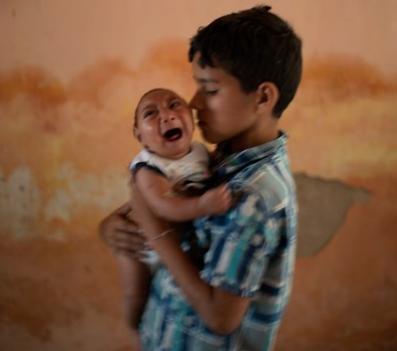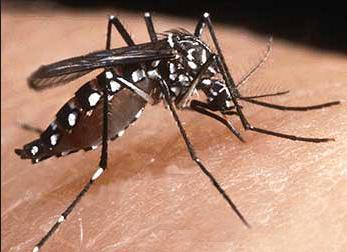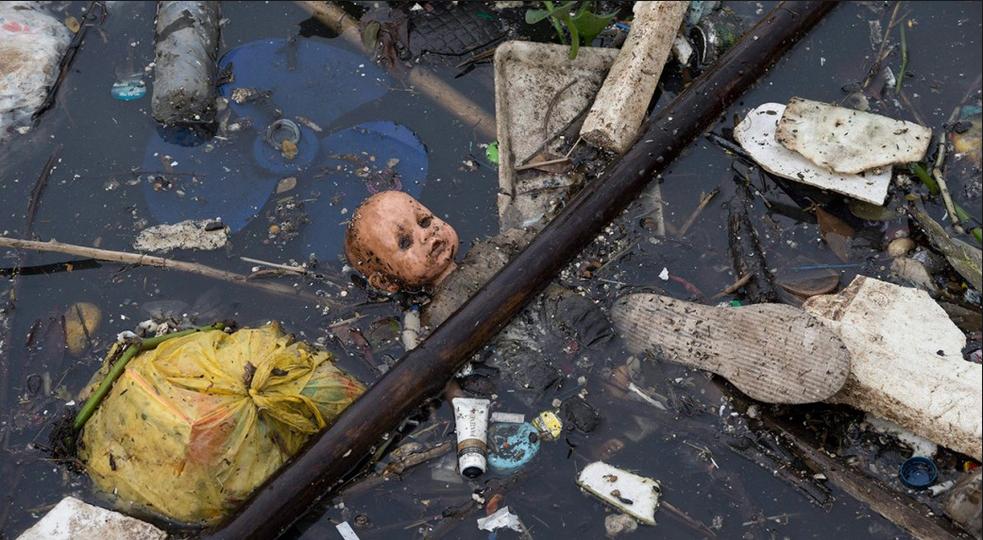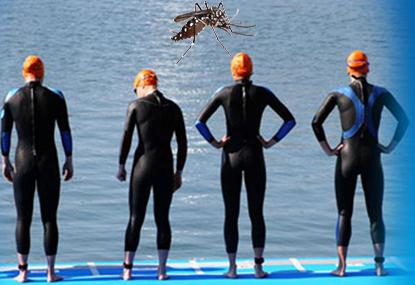2016 looks like being the Year of the Monkey for more reasons than one. The Zika Virus is out of control in Brazil and is linked to human birth defects known as microcephaly – incomplete brain development that is permanent. Babies are born with a debilitatingly small head and brain size, the size of a monkey. The brain is neurologically damaged and the disease can also lead to permanent paralysis. Not only that, but Zika causes Guillain-Barré Syndrome (GBS) which is a form of nerve damage and has proven fatal. Read More.
Not good. So best avoid it like the plague, like the Ebola Virus!
The virus has been linked to severe birth deformities in Latin America, particularly Brazil where more than 4000 cases of microcephaly have so far been reported in newborns.
Ten-year-old Elison with his 2-month-old brother Jose Wesley, who was born with microcephaly, in the Brazilian town of Poco Fundo, just 300km north-west of Rio:
 No gold medal is worth risking a monkey baby
No gold medal is worth risking a monkey baby
Female athletes are being seriously warned about the risk of contracting the Zika Virus if they attend the 2016 Summer Olympics in Rio de Janeiro in August. But then men also can easily catch it and then infect women with Zika Virus, since the disease can spread sexually.
The disease was first discovered in macaque monkeys in 1947 in Uganda’s Zika Forest and a decade later that the first human case was detected. So it is another bloody African disease, now going global thanks to migration and being proliferated by low-cost international airline travel.
There is currently no known cure or vaccine, with none on the distant horizon.
Just when we thought Ebola was under control, now we have another Third World disease to contend with!
Zika Virus is spread to humans primarily through a bite from an infected Aedes aegypti mosquito, commonly known as the Yellow Fever Mosquito, because it can cause skin to turn jaundiced.

This mosquito and the Zika Virus are related to similar diseases like Flavivirus, Chikungunya Virus, Yellow Fever, Dengue Fever, and West Nile Encephalitis. In 1741, 20,000 British soldiers died of the disease, then called “Black Vomit,” during an expedition to capture Peru and Mexico.
Calls to Boycott the Rio Olympics
The Rio Olympics is just too dangerous. Australian team Chef de Mission Kitty Chiller has said:
“The health and well-being of all our team members is paramount, especially those females in the team of child-bearing age. “We have a responsibility to ensure that we educate and inform all prospective team members of the potential risks and to put in place whatever mitigating measures we can.”
Rightly, our Australian Olympic Council (AOC) is the first athletics body to publicly express concern for female team members running risks of infection while pregnant. The AOC’s medical director, David Hughes, has also warned:
“All females of child-bearing age need to be aware of the specific risks of microcephaly in newborns, should the mother become infected during pregnancy. Following the recently updated DFAT* guidelines, any team members who are pregnant at the time of the Games need to consider the risks very carefully before deciding whether to proceed with travel to Brazil.” (*Australia’s Department of Foreign Affairs and Trade)
Isn’t every female competitor in an Olympics of child-bearing age? How many warnings do we need?
But information obtained on the grapevine indicates that Australian medical authorities are secretly considering boycotting the Rio Olympics in a bid to protect Australian athletes, their support crews and attending family and friends.
Australia’s Olympic Committee said no athletes have indicated they intended to withdraw at this stage, but it would “totally understand” if they did. Likewise across the Tasman, New Zealand’s Olympics Committee have stated that any competitors who decide to opt out would receive the committee’s “absolute support”.
Kenya’s Olympic Committee is considering boycotting the Rio Olympics to protect its athletes. It will pull its elite runners and other athletes out of the Rio Olympics unless it gets assurances they will not be exposed. “Obviously, we are not going to risk taking Kenyans there if this Zika virus reaches epidemic levels,” said the head of Kenya’s Olympics committee, Kipchoge Keino,
US goalkeeper of the United States women’s football team, Hope Solo, (34) says that if the Olympics were held today she would not be attending because of very real risk of Zika. “If I had to make the choice today, I wouldn’t go”, she said last week as she doesn’t want to sacrifice her chances of having a healthy baby one day. Solo has the blessings of the United States Olympic Committee saying that any athletes and staff concerned for their health should consider not going to the Rio Games.

The Brazil Olympic Committee or BOC (Comitê Olímpico do Brasil) in Rio de Janiero has been deliberately playing down the risk of Zika Virus, with a public campaign saying that Zika Virus is barely worse than a dose of flu, and only causes brief fever, a rash, some joint pain and in the worst cases a bit of headache and nausea. This is false.
They also claim that scarcely a dozen confirmed cases have been described in the medical literature and that nobody is known to have died from the Zika Virus.
Such misleading propaganda is reckless.
Third World is no place to stage the Olympics
It was indeed reckless back in 2009 for the International Olympic Committee to nominate Third World Brazil as the host nation for an Olympic Games. Other finalists were Madrid, Spain; Chicago, United States; and Tokyo, Japan. Chicago would have been the most capable venue.
Brazil is only the second Third World nation to do so after Mexico in 1968.
Mexico City was inappropriate as a venue being at an altitude of 7300 feet which resulted in 40 cases of altitude sickness where competitors collapsed during or after racing, including the Australian coxless pair. Last year, Australia’s legendary Olympian Ron Clarke died aged 78, from heart failure. During the Olympic marathon in 1968, Clarke had collapsed due to altitude sickness and suffered heart damage. It contributed to his premature death.
Rio is a Third World basket case like Mexico City. Rio is broke, polluted, drug crime ridden and now contagious. The 2016 Summer Olympics has imposed a US$18 billion financial burden on Third World Brazil. The Olympic construction budget is well blown. The country is broke, in recession, and hundreds of businesses have gone bankrupt. The government can’t afford to fund healthcare, let alone an extravagant First World Olympics. One of Rio’s Olympic stadiums last month had its water and lights cut off because of unpaid bills. The builder for two other venues has had to lay off workers and hasn’t paid suppliers.
When the OIC chose Rio for the 2016 Summer Olympics on October 2, 2009, it did so fully aware of Rio’s out of control organised drug crime and of the statistics of 6,000 people killed annually in the warring gang controlled slum areas of Rio, known as the ‘favelas’. One in four children in Brazil lives in a favela, and murders of young people are common, with 30,000 people aged 15-28 killed in 2013.
Previously on August 21, 2009, the United States Overseas Security Advisory Council rated Rio de Janeiro’s criminal threat level as “critical.” The council warned: “Violent crimes such as murder, rape, kidnapping, carjacking, armed assault, and burglary are a normal part of everyday life” in the city. Two weeks after the OIC decision, on October 17 that year, 19 people were killed and eight more injured after violent shoot-outs between rival drug gangs careened out of the favela slums and into neighboring communities.
On August 8, 2015, Brazil’s most wanted drug lord, Celso Pinheiro Pimenta (alias ‘Playboy’) was shot and killed in Rio a massive police operation that included 80 officers, armored cars, and a helicopter.
And the IOC expects the world to send its finest there?
Rio’s waterways are a Sewer
Australia’s team medical director, Dr. David Hughes, says that Rio’s water quality will be more of a threat to the health of athletes and officials at the Olympics than Zika. He says the polluted waters of Guanabara Bay and other aquatic venues for Olympic events were a serious health issue.
“If someone gets a nasty gastro infection, vomiting and diarrhea, it’s not ideal for competing in an Olympic environment,” Hughes said.
Testing of Guanabara Bay conducted by the AP over the last year shows disease-causing viruses linked to human sewage at levels well above what would be considered alarming in the U.S. or Europe.

Rio’s filthy deadly waters of Guanabara Bay
The IOC is reckless, if not criminal.
Since 2007, public health workers running routine diagnostics have detected antibodies against Zika Virus in a wide variety of places in tropical Africa and South-East Asia, which indicated that quite a lot of people had encountered Zika Virus at some point in their lives. In that year Zika broke out of its established range, with 180 cases in the isolated Micronesian island of Yap in the Pacific Ocean.
In 2013, a massive outbreak occurred in Polynesia, in the eastern end of the Pacific Ocean spreading to Easter Island early in 2014. Since 2015, Zika Virus has gained a foothold in Brazil exploding with more than a million cases, including the first fatalities and the association between Zika and the small brain disease in babies, microcephaly.
Cases of this emerging infectious disease are soaring in the Americas and “spreading explosively,” according to World Health Organization (WHO) Director-General Margaret Chan, MD. It has spread across Brazil including in Rio de Janeiro, and throughout South Americans and intop Central America. Several states in the US are reporting cases of U.S. travellers bringing the infection back with them, and health officials in Texas have confirmed a case of sexual transmission of the virus.
A baby born recently with microcephaly in Oahu, Hawaii, had been infected with Zika Virus, according to a press release from the Hawaii Department of Health, and the child’s mother had previously lived in Brazil — a Zika Virus hot zone with up to 1.3 million cases of infection.
Travellers from Brazil importing Zika Virus into Australia
In Australia, recent travellers to South American have returned to Brisbane and Melbourne infected by Zika. Several Australian Federal Police officers also contracted the mosquito-borne virus while they were deployed in the Solomon Islands.
Just last week a pregnant Queensland woman flew back into Brisbane from Brazil suffering signs and symptoms similar to dengue fever. She has tested positive to the Zika Virus. She was possibly attending the 2016 Rio Carnival 5-10 Feb. Now she has an agonising wait to discover the state of her newborn.
But Queensland Health is being cagey. It has only now confirmed that this is in fact the third known case of Zika Virus to be identified in Queensland this year. There is a public health over up going on. Australia’s Federal Health Minister Sussan Ley needs to come clean and be frank with Australians and about the real risk of Zika Virus to our athletes bound for Rio.
Another woman who returned to the Gold Coast from El Salvador last December has also tested positive to Zika Virus last week. Over the past two months she could have infected how many people she came in contact with?
Apparently three cases of the virus have been identified in Queensland this year, including a pregnant woman who contracted the illness in Tonga.
Another pregnant woman in Melbourne last week also has contracted the mosquito-borne virus after returning from Brazil. Victoria’s acting Chief Health Officer Roscoe Taylor has said the virus was transmitted by mosquitoes but could also be sexually transmitted. He also has said that there had been four cases of Zika Virus in Victoria over the past three years.
But the health authorities are keeping the cases quiet from the Australia public.
Why?
Zika now officially a Public Health Emergency of International Concern
On Feb 1 2016, the Director General of the World Health Organization, Dr Margaret Chan, convened an Emergency Committee teleconference meeting, under the International Health Regulations, to gather advice on the severity of the health threat associated with the continuing spread of Zika virus disease in Latin America and the Caribbean.
In assessing the level of threat, 18 experts and advisers looked in particular at the strong association, in time and place, between infection with the Zika virus and a rise in detected cases of congenital malformations and neurological complications.
The experts agreed that a causal relationship between Zika infection during pregnancy and microcephaly is strongly suspected, though not yet scientifically proven. All agreed on the urgent need to coordinate international efforts to investigate and understand this relationship better. The experts also considered patterns of recent spread and the broad geographical distribution of mosquito species that can transmit the virus. The lack of vaccines and rapid and reliable diagnostic tests, and the absence of population immunity in newly affected countries were cited as further causes for concern.
After a review of the evidence, the Committee advised that the recent cluster of microcephaly cases and other neurological disorders reported in Brazil, following a similar cluster in French Polynesia in 2014, constitutes an “extraordinary event” and a public health threat to other parts of the world. Members of the Committee agreed that the situation meets the conditions for a Public Health Emergency of International Concern.
“I have accepted this advice. I am now declaring that the recent cluster of microcephaly cases and other neurological disorders reported in Brazil, following a similar cluster in French Polynesia in 2014, constitutes a Public Health Emergency of International Concern.”
(Dr Margaret Chan Feb 1, 2016)
So the World Health Organisation (WHO) has declared the virus an international public health emergency and that Brazil is at the epicentre of the contagion in the lead up to the Rio Olympic Games. That is, Zika Virus has become a contagious pandemic. Virologists have been expressing concern about Zika virus for years and only now the World Health Organization is starting to listen.
The virus has been linked to severe birth deformities in Latin America, particularly Brazil where more than 4000 cases of microcephaly have so far been reported in newborns.
The Zika Virus out of control across Brazil and spreading rapidly across South America and into Central America, with outbreaks recently reported in Puerto Rico, Barbados, Curaçao, The Dominican Republic, Guadeloupe, Haiti, Jamaica, Martinique, Saint Martin, and in the U.S. Virgin Islands. Read More
January 28: “Last week, the US Centre for Disease Control and Prevention (CDC) urged pregnant women and women trying to conceive to postpone visits to Puerto Rico, Brazil, Colombia, El Salvador, French Guiana, Guatemala, Haiti, Honduras, Martinique, Mexico, Panama, Paraguay, Suriname and Venezuela. On Friday it added Barbados, Bolivia, Ecuador, Guadeloupe, Saint Martin, Guyana, Cape Verde and Samoa to the list.”
Major airlines have already started refunding thousands of tickets to South America – British Airways, Lufthansa, American Airlines, United Airlines and Delta. Read More
The rapid evolution of the virus means 2016 could be the Year of Zika.
Scary, with million expected to attend the 2016 Summer Olympics in Rio in just six months time. Our athletes will be there and exposed to Zika well before that preparing around contaminated Rio.
It’s just not worth it.


 Brazil’s drug wars continue out of control on the streets of Rio de Janeiro,
Brazil’s drug wars continue out of control on the streets of Rio de Janeiro,